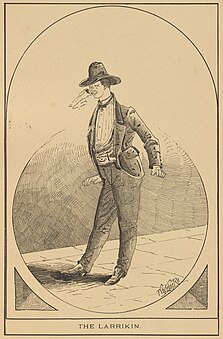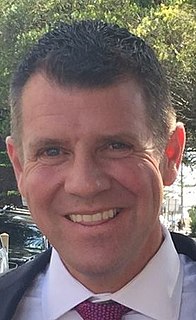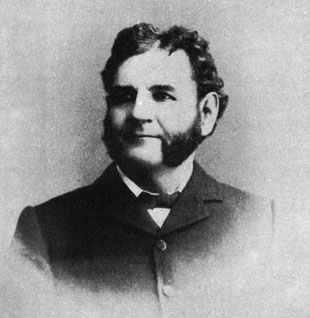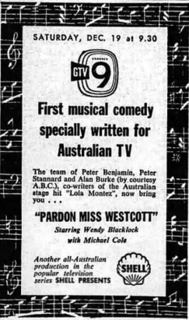Related Research Articles

"Waltzing Matilda" is a song developed in the Australian style of poetry and folk music called a bush ballad. It has been described as the country's "unofficial national anthem".

Andrew Barton "Banjo" Paterson, was an Australian bush poet, journalist and author. He wrote many ballads and poems about Australian life, focusing particularly on the rural and outback areas, including the district around Binalong, New South Wales, where he spent much of his childhood. Paterson's more notable poems include "Clancy of the Overflow" (1889), "The Man from Snowy River" (1890) and "Waltzing Matilda" (1895), regarded widely as Australia's unofficial national anthem.

Jack Thompson, AM is an Australian actor and a major figure of Australian cinema, particularly Australian New Wave. He was educated at University of Queensland, before embarking on his acting career. In 2002, he was made an honorary member of the Australian Cinematographers Society (ACS). He is best known as a lead actor in several acclaimed Australian films, including such classics as The Club (1980), Sunday Too Far Away (1975), The Man from Snowy River (1982) and Petersen (film) (1974). He won Cannes and AFI acting awards for the latter film. He was the recipient of a Living Legend Award at the 2005 Inside Film Awards.
Australian literature is the written or literary work produced in the area or by the people of the Commonwealth of Australia and its preceding colonies. During its early Western history, Australia was a collection of British colonies; as such, its recognised literary tradition begins with and is linked to the broader tradition of English literature. However, the narrative art of Australian writers has, since 1788, introduced the character of a new continent into literature—exploring such themes as Aboriginality, mateship, egalitarianism, democracy, national identity, migration, Australia's unique location and geography, the complexities of urban living, and "the beauty and the terror" of life in the Australian bush.

Larrikin is an Australian English term meaning "a mischievous young person, an uncultivated, rowdy but good hearted person", or "a person who acts with apparent disregard for social or political conventions".

Edward George Dyson, or 'Ted' Dyson, was an Australian journalist, poet, playwright and short story writer. He was the elder brother of illustrators Will Dyson (1880–1938) and Ambrose Dyson (1876–1913), with three sisters also of artistic and literary praise.
"Jim Jones at Botany Bay" is a traditional Australian folk ballad dating from the early 19th-century. The narrator, Jim Jones, is found guilty of poaching and sentenced to transportation to the penal colony of New South Wales. En route, his ship is attacked by pirates, but the crew holds them off. When the narrator remarks that he would rather have joined the pirates or indeed drowned at sea than gone to Botany Bay, Jones is reminded by his captors that any mischief will be met with the whip. In the final verse, Jones describes the daily drudgery and degradation of life as a convict in Australia, and dreams of joining the bushrangers and taking revenge on his floggers.

The "Bulletin Debate" was a well-publicised dispute in The Bulletin magazine between two of Australia's best known writers and poets, Henry Lawson and Banjo Paterson. The debate took place via a series of poems about the merits of living in the Australian "bush", published from 1892 to 1893.
Up The Country is a popular poem by iconic Australian writer and poet Henry Lawson. It was first published in The Bulletin magazine on 9 July 1892, under the title Borderland, and started the Bulletin Debate, a series of poems by both Lawson and Andrew Barton "Banjo" Paterson about the true nature of life in the Australian bush.
In Defence of the Bush is a popular poem by Australian writer and poet Andrew Barton "Banjo" Paterson. It was first published in The Bulletin magazine on 23 July 1892 in reply to fellow poet Henry Lawson's poem, Up The Country. Paterson's rebuttal sparked the Bulletin Debate, a series of poems by both Lawson and Paterson about the true nature of life in the Australian bush.
The Fact of the Matter is a poem by prolific Australian writer and poet Edward Dyson (1865–1931). It was first published in The Bulletin magazine on 30 July 1892 in reply to fellow poets Henry Lawson and Banjo Paterson. This poem formed part of the Bulletin Debate, a series of poems by Lawson, Paterson, and others, about the true nature of life in the Australian bush.

The Songs of a Sentimental Bloke is a verse novel by Australian novelist and poet C. J. Dennis. Portions of the work appeared in The Bulletin between 1909 and 1915, the year that Dennis completed the verse novel and had it published by Angus & Robertson. Written in the rough and comical Australian slang that was his signature style, the work became immensely popular in Australia, selling over 60,000 copies in nine editions within the first year of publication. Though its popularity peaked during World War I and the interwar period, it remains a classic of Australian literature and the best-selling book of poetry ever produced in the country.
The history of gangs in Australia goes back to the colonial era. Criminal gangs flourished in The Rocks district of Sydney in its early history in the 19th century. The Rocks Push was a notorious larrikin gang which dominated the area from the 1800s to the end of the 1900s. The gang was engaged in running warfare with other larrikin gangs of the time such as the Straw Hat Push, the Glebe Push, the Argyle Cut Push, the Forty Thieves from Surry Hills, and the Gibb Street Mob.

A general election for the 56th Parliament of New South Wales (NSW) was held on Saturday 28 March 2015. Members were elected to all 93 seats in the Legislative Assembly using optional preferential voting. Members were also elected to 21 of the 42 seats in the Legislative Council using optional preferential proportional representation voting. The election was conducted by the New South Wales Electoral Commission.

Laurence 'Larry' Foley was a nearly undefeated Australian middleweight championship boxer. An exceptional boxing instructor, his students included American champions Peter Jackson, and Tommy Burns, the incomparable English-born triple weight class champion Bob Fitzsimmons and Australian champion Mike Dooley. Due to his success as a boxing champion and internationally acclaimed instructor, and for introducing his country to the modern Queensberry Rules, he is often referred to as the "Father of Australian Boxing".
In Answer to Various Bards is a poem by Australian writer and poet Andrew Barton "Banjo" Paterson. It was first published in The Bulletin magazine on 1 October 1892 in reply to fellow poet Henry Lawson's poem, In Answer to "Banjo", and Otherwise.
The Poets of the Tomb is a poem by Australian writer and poet Henry Lawson. It was first published in The Bulletin magazine on 8 October 1892 in reply to fellow poet Andrew Barton "Banjo" Paterson's poem, In Answer to Various Bards.
A Voice from the Town is a poem by Australian writer and poet Andrew Barton "Banjo" Paterson. It was first published in The Bulletin magazine on 20 October 1894.

The Man from Snowy River and Other Verses (1895) is the first collection of poems by Australian poet Banjo Paterson. It was released in hardback by Angus and Robertson in 1895, and features the poet's widely anthologised poems "The Man from Snowy River", "Clancy of the Overflow", "Saltbush Bill" and "The Man from Ironbark". It also contains the poet's first two poems that featured in The Bulletin Debate, a famous dispute in The Bulletin magazine from 1892-93 between Paterson and Henry Lawson.

"Pardon Miss Westcott" is a 1959 Australian TV play by the Seven Network as part of drama anthology series Shell Presents. It was a musical set in colonial Australia and was broadcast live. It was Australia's first television musical comedy.
References
- ↑ "Terrible Murder at Miller's Point". Canberra Times . 1 July 1893. p. 3 – via Trove, National Library of Australia.
- ↑ Foley, Laurence (Larry) (1849 - 1917) Australian Dictionary of Biography
- ↑ The Captain of the Push at Australian Poetry Library
- ↑ The Bastard from the Bush at Tales of The Royal George
- ↑ Andrew B. Paterson, An Outback Marriage Chapter 3: "In Push Society"
- ↑ In Defence of the Bush